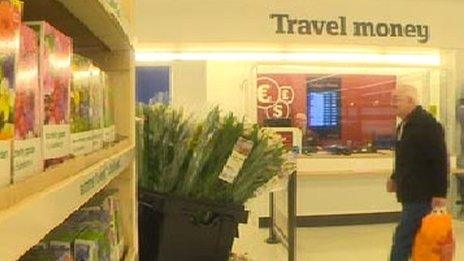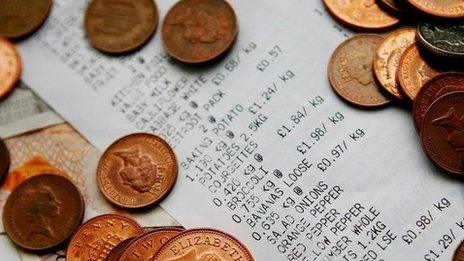Can supermarkets steal more of big banking's business?
- Published

Many supermarkets offer travel money and insurance products
Basket in hand in the supermarket aisle, it is time to consult the shopping list: milk, eggs, perhaps a roast for Sunday. But what about a savings account?
For years, supermarkets have been considered as potential challengers to the major High Street banks.
They have a huge, ready-made branch network - courtesy of their stores - and have massive financial clout.
Now, as they expand their product range in financial services, are they ready to take on big banking?
Or will they always play second fiddle, with consumers keen to keep their grocery and banking custom separate?
Go it alone
Originally, supermarkets entered the sector by signing up with the big banks.
That is still the case for M&S Bank, which although being the only one to offer a current account, is wholly owned by HSBC.
Asda Money is in partnership with a series of financial services providers and is a showroom for these products.
The shift has come from Tesco, the UK's largest supermarket chain, which was once in a joint venture with RBS. Since 2008, it has gone it alone, and now has a fully branded Tesco Bank based in Edinburgh. While it has just opened its seven millionth customer account, it is far smaller than the High Street banks.
Sainsbury's has just done something similar, cutting its links with Lloyds Banking Group.
All of them offer a range of financial products, such as credit cards, a host of insurance policies for homes, pets and cars, and travel money.
For these products, the supermarkets have featured on the best-buy tables.
"Supermarket banks have always been really competitive when it comes to the simple products like personal loans, credit cards and savings accounts," says James Daley, a personal finance expert who is launching the Fairer Finance website next month to allow consumers to compare providers on customer service.
But the challenge for any new bank, including the supermarkets, is breaking into the current account market, he adds.

James Daley says that current accounts will be the biggest challenge for supermarket banks
Only M&S Bank offers a current account, and that is a paid-for premium product. Sainsbury's has no plans for now to launch one, but Tesco is ready to do so within months.
A current account from Tesco has been expected for years, but the difficulty is that the retail giant needs to attract customers who already have accounts elsewhere, and that is difficult with so much consumer inertia in banking.
"People are still reluctant to switch, so these challengers are going to have to come up with something really special, and offer some great incentives," Mr Daley says.
Winning customers
Switching has become quicker and easier for bank customers.
The new Switch Guarantee means current account holders should be able to move to another provider within seven days.
After a customer has switched an account, a new redirection service automatically transfers any payments accidentally made to a customer's old account to the new account for 13 months.

Supermarkets can harness some of the information from loyalty cards
But the British Bankers' Association (BBA) says that even if it attracts customers, challenger banks - such as supermarkets - face tough regulatory requirements if they want to grow and challenge the major players.
"Britain's banks like competition - they compete to win new customers every day. Having a competitive market place is crucial to the industry's efforts to drive up standards and invest in innovation," said a BBA spokesman.
"A range of new providers are entering the market, including well-known supermarkets and technology companies, as well as a range of new and emerging challenger banks. We believe that the best way to aid competition is to allow new banks to be set up and let smaller ones grow."
But if supermarkets can clear the structural hurdles, they already have considerable loyalty from customers via reward schemes and could enter mainstream banking.
"It is another area of operation for them, and it is an obvious one for them to expand into because they know so much about their customers, and they have so many customers," says David Black, banking specialist at Consumer Intelligence.
"There is also the issue that the banks have a slightly bad reputation among many. So if [supermarkets] can capitalise on that, and use their marketing muscle to showcase their products in the banking and insurance world, they can pick up quite a few customers. They will become a real worry to the banks."